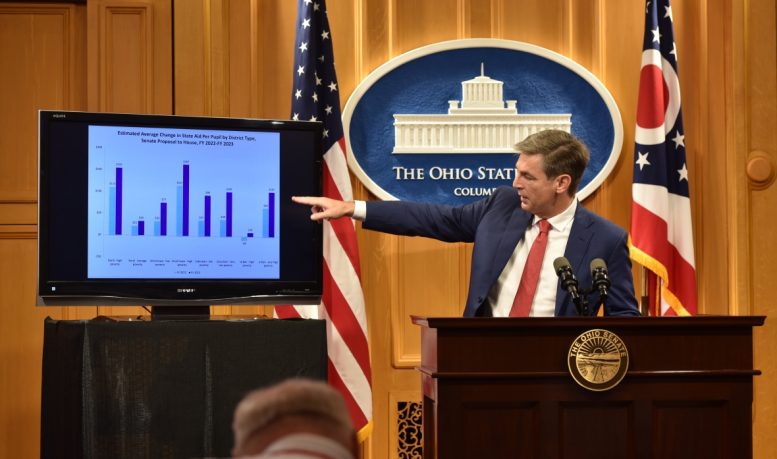By Susan Tebben
Officials representing Ohio’s teachers say the Senate’s new version of the public school funding overhaul leaves much to be desired, unlike the House version it would replace.
“It is a matter of political will and it’s a matter of priorities, and prioritizing public education just doesn’t seem to be where the Senate is when you look at the broad picture,” said Scott DiMauro, president of the Ohio Education Association, in a press call hosted by the Children’s Budget Coalition.
In a presentation of the Senate budget proposal earlier this week, Senate President Matt Huffman and state Sen. Matt Dolan, R-Chagrin Falls, questioned the sustainability of the House plan in terms of cost and said the Senate’s plan would would last through the six-year phase-in of the overhaul.
“The different is our plan is sustainable and can be paid for, not only in these two years, but in the out years,” Dolan said.
The Senate’s plan would set a base cost — the cost to educate one child in the state — at $6,110 per pupil. That number represents a 1.5% increase from the last biennial budget, but is less than the $7,200 per pupil base cost in the House plan.
One part of the House’s plan that remains in the Senate plan is the direct funding of private school voucher scholarships, often called EdChoice vouchers. With direct payments from the state, public school districts will no longer have a certain funding amount deducted from their funding, to represent a student who has moved (or has always been) in a private school.
While education officials say they are relieved that the direct payment piece survived the move from the House to the Senate, they are disappointed to see a 25% increase to private school voucher funds, well above the 1.5% increase public school students are getting.
“Under the Senate plan, a high school student getting a private school voucher would receive more state aid than kids attending 80% of Ohio’s public schools,” DiMauro said. “K-8 voucher students would get more funding than public school students at about 50% of public schools.”
Advocates for the House version of the school funding plan also criticized the 5% income tax cut included in the new budget proposal, saying it’s yet another cut to school support. Under the plan, which Huffman said is meant to reward workers more than the House plan’s 2% tax cut, tax revenues will be chopped a total of $874 million over the biennium.
This loss will only hinder schools who are asking for more funding and a better state-local balance.
“Losing this revenue will hamstring Ohio’s ability to adequately fund our schools and other important programs,” DiMauro said.
Tracy Najera, executive director of the Children’s Defense Fund and member of the Children’s Budget Coalition, said the tax dollars would be better spent as investments in the child care and public school education sectors so that working parents have less worries.
“We keep hearing from employers that they need folks in the workforce ready to hit the ground running,” Najera said. “That doesn’t happen by accident, it happens because you have a quality K-12 infrastructure.”
Public hearings on the budget began on June 2, with the legislature set to approve the budget by July.
***
Also from Ohio Capital Journal:
Parties battle over proposed elections changes in Ohio
The Republican sponsors of a bill proposing numerous changes to Ohio election law say they are open to some compromise with Democratic opponents.
But this olive branch comes with a warning.
“(Democrats) have so far given the back of their hand to a balanced bill,” said Rep. Bill Seitz, R-Cincinnati. “And the risk that they are taking is that by being disingenuous in their opposition, we might just say ‘OK, well, you don’t like a balanced bill, we might move it the rightward direction and then give you something really to howl about, OK?’”
House Bill 294, sponsored by Seitz and fellow Republican Rep. Sharon Ray of Wadsworth, has a ways to go before it becomes law. Ohio Democrats are preparing for the long fight. READ MORE
Senate passes bill making new penalties for crimes against police
The Ohio Senate unanimously passed legislation Wednesday that would increase penalties on protesters and others for alleged offenses against police.
Senate Bill 16 would create a new criminal offense: “unlawfully impeding public passage of an Emergency Service Responder (ESR).” It prohibits people from “recklessly obstructing” a highway, street, or sidewalk in such a manner as to make passage “impassable without unreasonable inconvenience or hazard.”
The first-degree misdemeanor charge would only apply if the obstruction prevents ESRs (law enforcement, EMS, firefighter, etc.) from accessing or leaving an emergency scene and people refuse to “cease the obstruction” upon command.
A conviction could result in up to 180 days in prison and or a fine of up to $1,000. The bill also beefs up several penalties related to assaulting or “menacing” ESRs. READ MORE

